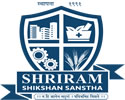NEP-2020
- Multidisciplinary/interdisciplinary:
SMVM, affiliated to SNDT Women’s University, Mumbai is established in 2014, under the management of Shriram Shikshan Sanstha, Paniv. Its objective is to evolve into a multidisciplinary institution. At present college is offering only B.Sc.(Chemistry) program at UG level and M.Sc. (Analytical Chemistry) at PG level, considering the demand and job opportunities available for chemistry graduates and post-graduates in various chemical industries and laboratories. It is a credit-based programme with mandatory skill based add-on short-term course during the tenure. The short-term course has equal credits along with the theory course and as per the regulations of affiliating University. Students are given exposure to experiential learning by organising study tours, field visits and industrial visits to understand the concepts in theory and short-term course.
Institute has sanction from State Govt. to start B.Com. and B. A. Programs too. Among the science faculty also, we have permission to introduce other subjects also. However, because of the Covid – 19 Pandemic these programs could not be started. In future, we intend to start these programs also to have more choices for the students and march towards multidisciplinary college. .
- Academic bank of credits (ABC):
The affiliating University has triggered process to register under Academic Bank of Credits (ABC). The Affiliating University is under the process of implementing ABC online with UGC directives that aim at facilitating the students in enriching their academic pursuits and academic welfare. As per the guidelines of university institution has registered on ABC portal and 100% of students have opened their ABC accounts since 2022-23.
- Skill development:
To promote skill development in order to enhance job potential, this year two value added short-term courses viz. i. Certificate course in safety in Laboratories and Industries and ii. Certificate course in sericulture , are being offered. College aims to offer more short-term courses at UG and PG level through CHETANA Programme of the SNDT Women’s University, Mumbai. In addition, days of national importance and commemorative days are observed to inculcate the human values like truth, justice, peace, love and non-violence, cooperation, national spirit and integration etc.
- Appropriate integration of Indian Knowledge system (teaching in Indian
Language, culture, using online course):
To promote the regional language i.e Marathi the institute celebrates all important events related to the promotion of Marathi language, literature, and culture viz Marathi language day . Students are encouraged to participate in cultural programs, essay competitions, elocution competitions etc. Students are encouraged to read Marathi news papers , magazines and novels.
- Focus on Outcome based education
(OBE) : Outcome-Based Education (OBE) is a pedagogical model that needs the restructuring of curriculum, pedagogy and assessment practices to reflect the achievement of higher level learning, as opposed to a mere accumulation of course credits. While the traditional education system focuses on what is taught, OBE places emphasis on what is learned, which is a student-centric model. IQAC held discussions with teachers on OBE to understand the concept. Affiliating university has designed all courses in line with OBE with expected Program Outcomes (PO), Program Specific Outcomes (PSO) and Course Outcomes (CO). The outcomes have been uploaded on the college website. Every faculty explains the course outcomes of each course before the commencement of the same.
The attainment of Course outcomes and Program specific outcomes is judged through the result of University examinations. Progression to higher education and placement also focus on attainment of Program specific outcomes and Program outcomes.
- Distance education/online education:
Though face to face Teaching – Learning methodology has no substitute, Covid-19 pandemic impelled all stakeholders to accept the online Teaching – Learning methodology. Online education offers flexibility to students to learn and gain knowledge as per requirements from home or any place. SWVM college made available adequate infrastructure needed for the online teaching. Teachers were trained to use the online portals like ZOOM, etc. for teaching purpose. Google classroom was used for providing the study material and evaluation process. Students also were trained to join the online lectures on such portals. All students have given complete education including practical through online mode during the Pandemic It proved to be a versatile tool particularly during the Covid-19 pandemic as it enabled conduct of online classes, management of attendance, submission of assignments, webinars, training programs, meetings etc. During the pandemic, most of the classes were conducted online and teachers and students have gained experience on working with digital tools such as Google Tools, YouTube to develop and deliver e-content, interactive power point presentations and other online content. At present offline, classes are being going on. Now being infrastructure is ready for both offline and online teaching –learning, we are looking forward towards blended teaching – learning process. Therefore, the students can gain the benefit of online teaching along with face-to-face interaction. Students will be inspired to undertake the courses offered by online portals such as Swayam,Coursera etc. to widen their sphere of knowledge.
Best Practice: Online Teaching –Learning during Pandemic.
Before pandemic in all the educational institutes only blackboard teaching through face to face interaction was the only methodology for teaching –learning. Teachers were unfamiliar with online teaching- creation of class, joining of students to class, live teaching, video preparation etc. But during pandemic, teachers learned to teach online using various platforms and students also adopted it.
Not only teaching but examination and evaluation also were conducted online.
